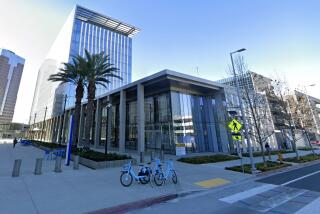Santa Barbara’s Poor Feel Sting of Ongoing Drought
- Share via
SANTA BARBARA — Luis Lopez pulled a handful of crumpled business cards from his pocket, all from landscape firms that had turned him down for gardening jobs this week.
The landscapers, Lopez said, all told him the same thing: “Come back when it rains.”
When Santa Barbara declared a drought emergency in late February, banning lawn watering and ordering other conservation methods, the city’s landscape industry was devastated. Lopez lost his job and apartment, and now he and his family live in a homeless shelter in downtown Santa Barbara.
“Most people in Santa Barbara think the drought is a hardship because their lawns are dying,” said Rogelio Trujillo, a board member of the Legal Defense Center. “But to low-income people in Santa Barbara, the drought is an economic crisis. People are fighting for survival.”
In addition to the loss of jobs among gardeners, farmhands and orchard workers, the water shortage has caused tremendous housing problems for the poor and new financial woes for other residents.
Last week, the city began mailing water bills that reflect sharply higher rates, and some landlords have responded by rewriting rental contracts and making tenants--many of whom already are struggling--responsible for water bills. Others simply have raised rents or evicted tenants who use too much water.
In the last few days, the billing office has been deluged with calls from angry residents from all economic strata.
One man with a fast leak in his toilet had a water bill of $2,725, said Lew Lewis, billing manager for the city. Several apartment complexes and laundries have had bills of more than $4,000.
“I’ve seen so many $400 and $500 water bills I’m not shocked anymore,” said Damian Martinez, who works in the billing office. “People call the office and can’t believe it. They think it’s some kind of mistake.”
Said Catholic Charities worker Josie Mendoza: “People who’ve had their rents raised by $100 and $200 a month or who need help paying their water bills have been coming in all week.”
“These are people who are already paying more than half of their income on rent. . . . If it goes much higher, they won’t have any money left for food.”
Water has become such a valuable commodity in Santa Barbara that some residents are hooking up hoses to neighbors’ faucets and stealing water. After Lewis received a number of calls recently from residents complaining about water theft, he decided to protect his own water supply. He plans to put locks on all his outdoor faucets.
While some residents still haven’t cut their water use to cope with the drought, most have conserved, Lewis said. During the last three months, water use in the city has decreased by about 40%.
But poor families have a harder time keeping their water bills low because many have to share apartments with two and three other families in order to afford the rent, said Mendoza of Catholic Charities. And now, because water costs are so high, some landlords are evicting families to limit the number of people per apartment. As a result, many families are now homeless for the first time, Mendoza said. The Latino community, which has relied on the landscape industry and local ranches for jobs, has been particularly hard hit.
Transition House, a local homeless shelter that used to house many white, single people, is now filled entirely with Latino families. So many people need help now that for the first time since its inception six years ago, the shelter had to turn families away.
People can’t afford to leave the shelter now, said Pat Henningsen, an administrator at Transition House. In the past, the shelter would match two families who could pool their incomes and then rent an apartment. But since most landlords now won’t rent to more than one family per unit, many are marooned at area shelters.
“What we’re seeing now is just the tip of the iceberg,” Henningsen said. “This summer, when people are late paying their water bills, there’s going to be major problems. A $100 water bill is a tremendous amount of money for someone making $7 an hour.”
Food banks and soup lines have been inundated by the newly unemployed or homeless, said Christina Cruz, a minister for Christ Lutheran Church. The number of people who line up for the church’s food bank on Saturday mornings--about 700--has tripled in the last three months.
The situation has been exacerbated by the Immigration and Naturalization Service crackdown on employers who hired undocumented workers. Many families are now leaving the area in order to survive, Cruz said. Some have moved to Northern California to pick fruit; others have moved back to Mexico. Some families have split up, with the men staying, looking for temporary housing, and the women and children returning to Mexico.
“I recently talked to a guy who has to move because his landlord raised the rent from $625 to $725 because of the water bills,” said Don Combs of the Santa Barbara Tenants Union. “The tenant just can’t afford it. Other people are complaining that their landlords are shutting down all laundry facilities in the apartments because they don’t want to pay for the water. This may not sound like a big deal, but if you’re elderly or disabled and don’t have a car, it can be a real hardship.”
Bartlein & Co. Inc., the largest property management firm in Santa Barbara, recently sent notices to all tenants informing them they are now “responsible for 100% of water usage,” said Robert Bartlein, the company’s owner. But, Bartlein said, if all tenants in a building conserve and keep their overall water use below a specified level his company will then pay all water costs.
Because tenants do not want to be stuck with the water bill, Bartlein said, some have turned in neighbors who have jammed numerous people into apartments. In the past few weeks the company has served about 15 tenants--who have unauthorized people living in their apartments--with eviction notices.
If residents use moderate amounts of water, their bills will not be exorbitant, said Lewis of the city’s billing department. But the new price structure is designed to charge much higher rates once residents exceed a basic water allotment. For example, Lewis said, the average single family dwelling in the city uses about 6,000 gallons of water a month. Last month that would cost residents about $8; under the new rates the cost would be $17. But if residents used double that amount of water, this month’s bill would be $135, compared to $22 under the old rate structure.
City officials realize the higher water bills will be a hardship for the poor, and they have proposed creating a long-term payment plan, so residents will not be faced with water shut-offs at the end of the month, Lewis said. Also, the city has advised landlords not to raise rents but instead divide excessive water costs in apartment buildings among tenants.
“A lot of people couldn’t pay their water bills before this drought, so with these new rates I know we’re going to be having a lot of problems,” Lewis said. “I really feel for these people. But all we can really do to help is work out a payment schedule, so they won’t have to come up with the whole bill at once.”
More than 75 people a day have been calling the city’s water billing office, complaining about the high water rates, said Frances Arellano, a billing clerk. Some residents call because they can’t afford to pay their bills; others simply are offended that water, which they once took for granted, should be so expensive.
Zahra Kesharvaz marched into City Hall recently, clutching her $1,021.08 water bill. “This is outrageous. . . . This isn’t a water bill, this is house payment,” she said, waving the bill angrily.
Kesharvaz said she has cut her water use during the last few months and even takes all her showers at a health club. But her family has a two-acre estate with 43 fruit trees and they recently spent $200,000 in landscaping.
“We spent all that money on the grounds. . . . There’s no way I’m going to let it all die,” she said. “That much landscaping requires a lot of water.”
Kesharvaz appealed the water bill to officials at City Hall, who told her that because there are eight people living at her house, she is eligible for a “large household exemption.” She could obtain a larger water allotment if she installed low-flow toilets and shower heads that use less water.
But Kesharvaz told them she was not interested. She has a designer house, she said, and the low-flow toilets are not available in colors that match the decor of her bathroom.
More to Read
Sign up for Essential California
The most important California stories and recommendations in your inbox every morning.
You may occasionally receive promotional content from the Los Angeles Times.













